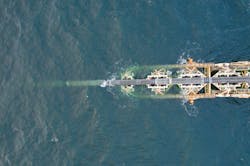US, Germany strike deal to end tensions over Nord Stream 2 gas pipeline
The United States and Germany announced July 21 a deal that effectively ends US efforts to use the threat of sanctions to block completion of the Nord Stream 2 natural gas pipeline.
“While we remain opposed to this pipeline, we reached the judgment that sanctions would not stop its construction and risked undermining a critical alliance with Germany, as well as with the EU and other European allies,” a State Department official said, speaking on condition of anonymity.
The deal involves German financial and diplomatic assistance to Ukraine, partly with the goal of continuing gas pipeline shipments from Russia across Ukraine to other European countries beyond 2024, when Ukraine’s current gas transit agreement with Russia ends.
Nord Stream 2 is a twin-line pipeline intended to run on the bed of the Baltic Sea 764 miles from Vyborg, Russia, to Lubmin, Germany, with a capacity of 55 billion cu m/year, the same as Nord Stream 1. Successive US administrations have objected that the line may give Russia economic leverage to affect European policies.
The project has progressed to the point that Nord Stream 2, owned by Russian gas giant Gazprom, announced June 10 the mechanical completion of one of the twin lines. The other line had only 62 miles remaining to be built, according to Russian officials, and was expected to be completed this year.
The Biden administration in May waived penalties for non-Russian European companies and investors helping to complete the pipeline. Sanctions against Russian companies remain an active tool, despite the State Department’s estimate that completion of the line is virtually a fait accompli.
Gas wanted via Ukraine
The deal announced July 21 puts most of its emphasis on assistance to Ukraine, especially in light of Russia’s 2014 annexation of Crimea and Russia’s support since 2014 for insurrection in the Dombas region of eastern Ukraine.
Russia has in the past temporarily cut off gas shipments to and through Ukraine to punish the country, and its construction of Nord Stream 1 and 2 through the Baltic has raised fears of an end to shipments via Ukraine.
“The United States and Germany are united in their belief that it is in Ukraine’s and Europe’s interest for gas transit via Ukraine to continue beyond 2024,” the US and Germany said in a joint statement. “In line with this belief, Germany commits to utilize all available leverage to facilitate an extension of up to 10 years to Ukraine’s gas transit agreement with Russia.”
The proposed extension “would preserve gas flows and transit revenue that Ukraine would otherwise stand to lose once Nord Stream 2 becomes operational, postponing the negative impacts of the pipeline on Ukraine and other transit countries such as Slovakia,” the State Department official said.
“Should Russia attempt to use energy as a weapon or commit further aggressive acts against Ukraine, Germany will take action at the national level and press for effective measures at the European level, including sanctions, to limit Russian export capabilities to Europe in the energy sector, including gas,” the joint statement said.
“This commitment is designed to ensure that Russia will not misuse any pipeline, including Nord Stream 2, to achieve aggressive political ends by using energy as a weapon,” the joint statement said.
Reversible gas flows
The agreement includes the idea of sending gas eastward to Ukraine rather than leaving the country dependent on westward flows of gas from Russia.
Germany is “ready to launch a Ukraine Resilience Package to support Ukraine’s energy security,” the joint statement said. “This will include efforts to safeguard and increase the capacity for reverse flows of gas to Ukraine, with the aim of shielding Ukraine completely from potential future attempts by Russia to cut gas supplies to the country.”
Germany committed to provide an initial donation of $175 million for a “Green Fund” to help Ukraine develop renewable energy, increase energy efficiency, and reduce use of coal.
About the Author
Alan Kovski
Washington Correspondent
Alan Kovski worked as OGJ's Washington Correspondent from 2019 through 2023.
